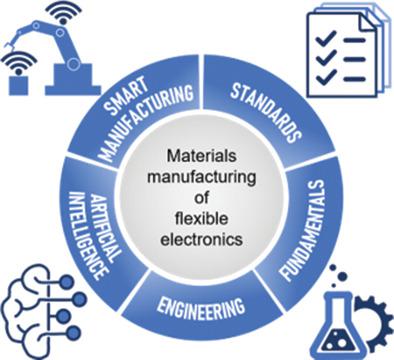当前位置:
X-MOL 学术
›
Adv. Mater.
›
论文详情
Our official English website, www.x-mol.net, welcomes your feedback! (Note: you will need to create a separate account there.)
Devising Materials Manufacturing Toward Lab-to-Fab Translation of Flexible Electronics.
Advanced Materials ( IF 29.4 ) Pub Date : 2020-08-02 , DOI: 10.1002/adma.202001903 Yifei Luo 1, 2 , Ming Wang 1 , Changjin Wan 1 , Pingqiang Cai 1 , Xian Jun Loh 2, 3 , Xiaodong Chen 1
Advanced Materials ( IF 29.4 ) Pub Date : 2020-08-02 , DOI: 10.1002/adma.202001903 Yifei Luo 1, 2 , Ming Wang 1 , Changjin Wan 1 , Pingqiang Cai 1 , Xian Jun Loh 2, 3 , Xiaodong Chen 1
Affiliation

|
Flexible electronics have witnessed exciting progress in academia over the past decade, but most of the research outcomes have yet to be translated into products or gain much market share. For mass production and commercialization, industrial adoption of newly developed functional materials and fabrication techniques is a prerequisite. However, due to the disparate features of academic laboratories and industrial plants, translating materials and manufacturing technologies from labs to fabs is notoriously difficult. Therefore, herein, key challenges in the materials manufacturing of flexible electronics are identified and discussed for its lab‐to‐fab translation, along the four stages in product manufacturing: design, materials supply, processing, and integration. Perspectives on industry‐oriented strategies to overcome some of these obstacles are also proposed. Priorities for action are outlined, including standardization, iteration between basic and applied research, and adoption of smart manufacturing. With concerted efforts from academia and industry, flexible electronics will bring a bigger impact to society as promised.
中文翻译:

设计材料制造以实现柔性电子的实验室到工厂的转换。
在过去的十年中,柔性电子学在学术界取得了令人兴奋的进展,但是大多数研究成果尚未转化为产品或获得了很大的市场份额。对于大规模生产和商业化,新开发的功能材料和制造技术的工业采用是先决条件。但是,由于学术实验室和工业工厂的不同功能,将材料和制造技术从实验室转换为晶圆厂非常困难。因此,在本文中,从产品制造的四个阶段(设计,材料供应,加工和集成)确定了柔性电子材料的材料制造过程中面临的主要挑战,并对其从实验室到工厂的转换进行了讨论。还提出了针对行业战略以克服这些障碍的观点。概述了行动的优先级,包括标准化,基础研究与应用研究之间的迭代以及智能制造的采用。在学术界和工业界的共同努力下,柔性电子将如所承诺的那样对社会带来更大的影响。
更新日期:2020-09-15
中文翻译:

设计材料制造以实现柔性电子的实验室到工厂的转换。
在过去的十年中,柔性电子学在学术界取得了令人兴奋的进展,但是大多数研究成果尚未转化为产品或获得了很大的市场份额。对于大规模生产和商业化,新开发的功能材料和制造技术的工业采用是先决条件。但是,由于学术实验室和工业工厂的不同功能,将材料和制造技术从实验室转换为晶圆厂非常困难。因此,在本文中,从产品制造的四个阶段(设计,材料供应,加工和集成)确定了柔性电子材料的材料制造过程中面临的主要挑战,并对其从实验室到工厂的转换进行了讨论。还提出了针对行业战略以克服这些障碍的观点。概述了行动的优先级,包括标准化,基础研究与应用研究之间的迭代以及智能制造的采用。在学术界和工业界的共同努力下,柔性电子将如所承诺的那样对社会带来更大的影响。


























 京公网安备 11010802027423号
京公网安备 11010802027423号